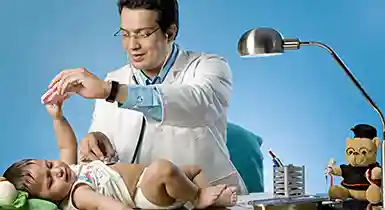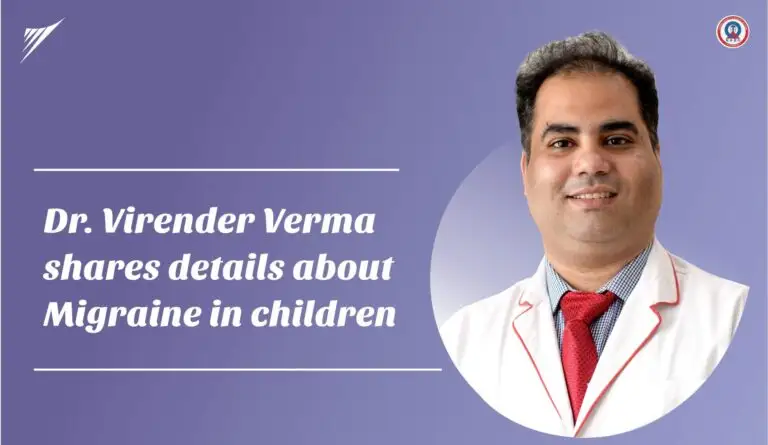Paediatrics
Is a specialty that diagnosis and treats ailments in children. The specialty covers all aspects in child from monitoring growth, vaccination, and treatment of general diseases to specific ones.
Paediatrics and Neonatology:
Paediatrics is a medical specialty that manages medical conditions affecting babies, children and young people. Neonatology is a subspecialty of paediatrics that consists of the medical care of new-born infants, especially the ill or premature new-born infant. It is a hospital-based specialty, and is usually practiced in neonatal intensive care units (NICUs).
Wockhardt Hospital is well equipped with all types of neonatal and paediatric emergencies. Working with subspecialists in other fields, such as cardiology and pulmonology, our team of experts treats infants suffering from a variety of health conditions, diagnosing conditions at birth is very crucial for wellbeing of the infant and further management. We believe that neonatal care should start from foetal life. Paediatric department has well equipped NICU & PICU with round the clock paediatrician and neonatologist available for 24hrs NICU. Our team of well qualified Neonatologist, round-the-clock Neonatal Intensivists and specially trained Neonatology Nurses strive hard to provide the best treatment to all neonates.
Nowadays Paediatrics in itself is divided into various specialities:
General Paediatric Services:
Paediatric Medicine:
- Treatment of Common cough, cold and fever
- Ashtma and other respiratory disorders- increase understanding of asthma in children, improve awareness and quality of life through symptom control, and maintaining daily activities
- Food allergies and other : Offers personalised service to diagnose and treat allergies, using scientifically validated diagnostic tests and internationally recognised allergic treatments.
- Skin infections
- Gastrointestinal disorders like diarrhea, constipation, colic pain, vomiting
- ENT Problems
What are the Various Diseases that it Covers?
Spectrum of Services as per sub specialities include:
Paediatric Medicine:
- Common cough, cold and fever
- Asthma and other respiratory disorders- increase understanding of asthma in children, improve awareness and quality of life through symptom control, and maintaining daily activities
- Food allergies and other: Offers personalised service to diagnose and treat allergies, using scientifically validated diagnostic tests and internationally recognised allergic treatments.
- Skin infections
- Gastrointestinal disorders like diarrhoea,
- Constipation, colic pain, vomiting
- ENT Problems
Paediatric Cardiology:
The paediatric cardiology provides a complete spectrum of medical and surgical services and aims to provide care for children in a child-friendly environment.
- Interventional Cardiology procedures are carried out is to gather evidence in the diagnosis of cardiac or pulmonary disease and to carry out interventional procedures for the non-surgical repair of congenital heart defects. Other procedures conducted include devices to close holes in the heart, valve replacements or inflated balloons to enlarge narrow vessels.
- The Electrophysiology (EP) Service offers a full range of diagnostic and therapeutic interventions for primary arrhythmias in children, some of which may be inherited or associated with congenital heart disease.
- Cardiovascular surgeries performed are There are many kinds of heart defects. Some are minor, and others are more serious. Defects can occur inside the heart or in the large blood vessels outside the heart. Some heart defects may need surgery right after the baby is born.:
- Aortic valve surgery – minimally invasive
- Aortic valve surgery – open
- Atrial septal defect (ASD)
- Coarctation of the aorta
- Congenital heart defect – corrective surgery
- Patent ductus arteriosus
- Tetralogy of Fallot
- Transposition of the great vessels
- Truncus arteriosus
- Ventricular septal defect
Paediatric Surgery: Deals with a wide range of surgical procedures required in children and focuses on the unique physiology and anatomy of the young patient, including newborn surgery, correction and treatment of various congenital anomalies and care of the child with accidental trauma.
Common paediatric diseases that may require paediatric surgery include:
- congenital malformations: lymphangioma, cleft lip and palate, esophageal atresia and tracheoesophageal fistula, hypertrophic pyloric stenosis, intestinal atresia, necrotizing enterocolitis, meconium plugs, Hirschsprung’s disease, imperforate anus, undescended testes abdominal wall defects:
- childhood tumours: like neuroblastoma, Wilms’ tumour, rhabdomyosarcoma, ATRT, liver tumours, teratomas
- Separation of conjoined twins.
Paediatric Neurology: Offers evaluation and management of children with diseases affecting nervous system and muscles, epilepsy, headaches and more :
- The Autism Spectrum disorder o
- The Brain Development diagnostic services for children with brain development disorders. .
- Epilepsy
- Learning Disabilities
Paediatric Ophthalmology: is a sub-speciality of ophthalmology concerned with eye diseases, visual development, and vision care in children. Pediatric ophthalmologists focus on the development of the visual system and the various diseases that disrupt visual development in children. Pediatric ophthalmologists also have expertise in managing the various ocular diseases that affect children.
Conditions include:
Paediatric ophthalmologists are specially trained to manage the following disorders:
- Infections (Conjunctivitis).
- Strabismus:Amblyopia (aka lazy eye) occurs when the vision of one eye is significantly better than the other eye, and the brain begins to rely on the better eye and ignore the weaker one. Blocked tear ducts.
- Ptosis
- Retinopathy of prematurity
- Nystagmus
- Visual inattention
- Paediatric cataracts
- Paediatric glaucoma
- Abnormal vision development
- Genetic disorders
- Orbital tumours
- Refractive errors such as myopia (near-sightedness), hyperopia (far-sightedness) and astigmatism can often be corrected with prescriptions for glasses or contacts.
Paediatrics Orthopaedics and Rheumatology: A Paediatric Orthopaedic Surgeon is dedicated to the care of musculoskeletal problems in children and adolescents.. Paediatric Orthopaedic Surgery is a valuable and powerful tool in the rehabilitation armamentarium for improving musculoskeletal function in several childhood disorders.
Disorders treated:
- Traumatic injuries
- Bone and Joint Infections
- Neuromuscular Disorders, e.g., Cerebral Palsy, Poliomyelitis, Spina Bifida, Muscle Dystrophy
- Congenital Malformations, e.g., Club Foot, Congenital Vertical Talus, DDH, etc.
- Spinal problems
- Limb Deformities, e.g., Bow legs, Knock knees, Torsional problems, Flat Feet, etc.
- Perthes disease, Slipped Capital Femoral Epiphysis, Coxa vara
- Burns Contractures
- Juvenile Rheumatoid Arthritis
- Sports Injuries
- Postural disorders, including Backpack injuries and Computer Related Injuries
Paediatric haematology: Investigations and advise all blood disorders, including challenging diagnostic or therapeutic problems. Provides services for transfusion, infusion, chemotherapy as well as day care procedure.
Paediatric Neonatology:
A neonatologist treats the following conditions that may arise after delivery of a new born:
- Birth asphyxia and Respiratory Distress Syndrome
- Assessment of Congenital heart disease and Congenital anomalies (birth defects)
- Diagnosis and Evaluation of Jaundice
- Infectious diseases such as pneumonia
- Management of Complicated cases of Respiratory Distress Syndrome, Pneumonias and Meconium Aspiration
- Persistent Pulmonary Hypertension
- Congenital heart disease and other surgical emergencies
- Assessment and treatment of Neonatal seizures, jaundice, haematological and metabolic conditions
- Care of the extremely premature and low birth weight babies
Generally neonates are kept in a NICU which is fully equipped. A NICU is equipped with incubators including transport incubators, invasive and non-invasive ventilators, high frequency ventilator, phototherapy units, bili-blankets, multipara monitors, invasive blood pressure monitors, etc. to
The NICU provides:
- Neonatal ventilation
- Surfactant administration
- CPAP Care Extra-corporeal membrane oxygenation (ECMO) or Extra-corporeal Life Support (ECLS) for severe respiratory failure, persistent pulmonary hypertension of a newborn infant, and congenital heart disease
- Phototherapy in case of neonate jaundice
- Provides Exchange transfusion
- Invasive blood pressure monitoring
- Assists in Therapeutic neonatal hypothermia
- Supports Lactation management


















